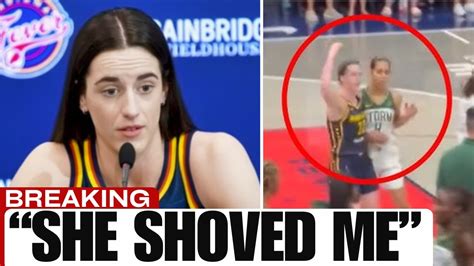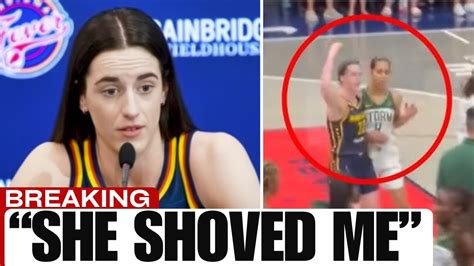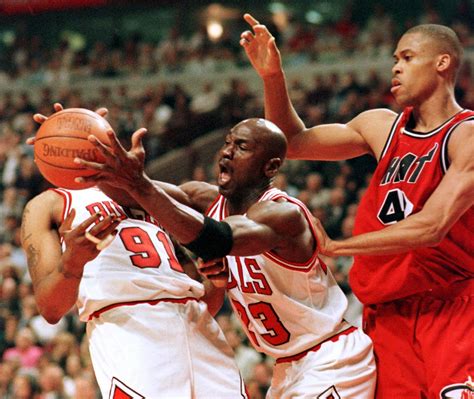
Caitlin Clark was knocked to the floor during the Indiana Fever’s 88-84 loss to the Connecticut Sun on Tuesday night, a game marked by physical play and continued struggles for the Fever.
UNCASVILLE, Conn. – The Indiana Fever’s woes continued Tuesday night as they fell to the Connecticut Sun 88-84, a game overshadowed by a controversial play involving rookie sensation Caitlin Clark. Clark was knocked to the ground in the third quarter by Sun guard Alyssa Thomas, a moment that ignited debate about the physicality directed towards the WNBA’s newest star and the officiating of such plays.
The incident occurred with 5:56 remaining in the third quarter. As Clark attempted to navigate through traffic near the free-throw line, Thomas appeared to intentionally use her forearm to shove Clark, sending her sprawling to the hardwood. No foul was called on the play, a decision that drew immediate criticism from Fever fans and observers alike.
“It’s just a really physical game,” Clark said after the game. “That’s just the way it is. You’ve got to be able to handle that. Everybody’s physical with me, and, you know, I’ve just got to be able to handle it and keep playing.”
The lack of a foul call prompted widespread discussion on social media and among basketball analysts, with many arguing that the play warranted at least a common foul, if not a flagrant one. Critics pointed to the apparent intent behind Thomas’s shove, suggesting it was an unnecessary and potentially dangerous play.
Fever coach Christie Sides expressed her frustration with the officiating, though she refrained from directly commenting on the specific no-call. “I’m disappointed with the way the game was officiated,” Sides said. “I felt like there were a lot of missed calls, and I’m going to have to go back and look at the film.”
The game itself was a tightly contested affair, with both teams trading leads throughout the night. The Sun ultimately prevailed, fueled by a strong performance from DeWanna Bonner, who scored a game-high 22 points. Brionna Jones added 17 points and eight rebounds for Connecticut.
For the Fever, Clark finished with 17 points, five assists, and three rebounds. She shot 5-of-11 from the field, including 3-of-8 from beyond the arc. Kelsey Mitchell led the Fever with 19 points, while Aliyah Boston contributed 12 points and eight rebounds.
Despite the loss, Clark remained focused on the bigger picture, emphasizing the need for the Fever to improve as a team. “We’re still learning,” Clark said. “We’re a young team, and we’re going to go through growing pains. We just have to stay positive and keep working hard.”
The Fever’s struggles extend beyond the controversial plays. They are now 2-9 on the season, and their inability to consistently close out games has been a recurring theme. Turnovers and defensive lapses have plagued the team, preventing them from capitalizing on their offensive potential.
The physicality Clark has faced since entering the WNBA has been a topic of ongoing discussion. Some analysts argue that it is simply part of the game, a way for opponents to test the rookie and try to throw her off her rhythm. Others contend that Clark is being targeted unfairly, with opponents using excessive force in an attempt to intimidate her.
Regardless of the motivation, the intensity of the competition is undeniable. Clark has consistently stated that she is prepared for the physicality and that she will not back down. However, the debate over what constitutes fair play and what crosses the line into dangerous territory continues to rage on.
The WNBA has a history of physical play, and it is not uncommon for rookies to face a heightened level of intensity as they adjust to the league. However, the attention surrounding Clark has amplified the scrutiny on every play, making it more difficult to distinguish between legitimate defense and unnecessary aggression.
The Fever will need to address their defensive vulnerabilities and reduce their turnovers if they hope to turn their season around. They also need to find ways to support Clark offensively, ensuring that she is not the sole focus of opposing defenses.
The incident involving Clark and Thomas is likely to fuel further debate about the WNBA’s officiating standards and the treatment of its star players. As the season progresses, it will be interesting to see how the league addresses these concerns and whether any changes are made to ensure player safety and fair play.
The game was broadcast nationally, further amplifying the discussion surrounding the controversial play. Social media platforms were flooded with opinions, with many fans expressing outrage over the no-call and calling for the league to take action.
The WNBA has yet to release an official statement regarding the incident. However, it is likely that the league will review the play and consider whether any disciplinary action is warranted. In the meantime, the debate over the physicality of the game and the treatment of Clark will continue to dominate the headlines.
Despite the challenges, Clark remains optimistic about the Fever’s future. “We’re going to get there,” she said. “It’s going to take time, but we’re committed to working hard and improving every day.”
Further Analysis and Context:
The Caitlin Clark phenomenon has undeniably brought unprecedented attention to the WNBA. Her transition from college basketball to the professional ranks has been met with both excitement and scrutiny. The heightened physicality she’s experiencing is not entirely unexpected, as it’s a common rite of passage for rookies entering any professional league. However, the intensity seems amplified due to her fame and the pressure opposing teams face when playing against her.
Several factors contribute to the increased physicality. Defensively, teams are trying to disrupt her rhythm and limit her scoring opportunities. Offensively, opponents might be trying to exploit her perceived weaknesses, both physically and mentally, hoping to draw her into foul trouble or force turnovers. The WNBA, known for its competitive spirit and experienced players, provides a challenging environment for any newcomer, especially one under such a bright spotlight.
The officiating, as Coach Sides pointed out, also plays a critical role. Consistency in calling fouls and ensuring player safety are paramount. The perception of missed calls can lead to frustration among players and fans, potentially escalating tensions on the court. The league has a responsibility to maintain a balance between allowing physical play and protecting players from unnecessary harm.
Beyond the specific incident involving Alyssa Thomas, the Fever’s overall performance highlights the challenges of building a competitive team. A young roster requires time to develop chemistry, learn from mistakes, and execute strategies effectively. The Fever’s high turnover rate and defensive lapses are indicative of a team still finding its identity and cohesion.
Clark’s individual performance, while showing flashes of brilliance, also reflects the learning curve she’s navigating. She’s facing more experienced defenders, tighter coverage, and faster-paced play compared to college. Her ability to adapt, make quick decisions, and minimize turnovers will be crucial for her development and the team’s success.
The WNBA’s response to these issues will be closely watched. The league needs to address concerns about officiating consistency, player safety, and the overall fairness of the game. Balancing the competitive nature of the league with the need to protect its players, especially its rising stars, is a delicate but essential task. The long-term health and growth of the WNBA depend on maintaining a safe and equitable environment for all its athletes.
The media coverage surrounding Clark and the Fever has been extensive, adding another layer of pressure to the situation. Every game, every play, and every comment are analyzed and dissected, creating a constant buzz around the team. This heightened attention can be both beneficial and detrimental, providing exposure for the league but also amplifying the pressure on the players.
Ultimately, the Fever’s success will depend on their ability to learn from their mistakes, develop a strong team identity, and adapt to the challenges of the WNBA. Clark’s performance, while important, is just one piece of the puzzle. The entire team needs to contribute, support each other, and work together to achieve their goals. The journey will be filled with ups and downs, but the commitment to improvement and the ability to stay positive will be key to their long-term success.
Expansion on Key Players and Team Dynamics:
-
Caitlin Clark: Beyond her scoring prowess, Clark’s playmaking ability is crucial for the Fever. Her court vision and passing skills can create opportunities for her teammates, but she needs to minimize turnovers under pressure. Her defensive contributions also need improvement as she adjusts to the speed and physicality of the WNBA.
-
Kelsey Mitchell: As a veteran player, Mitchell’s leadership and scoring ability are vital for the Fever. She needs to provide consistent offensive support alongside Clark and help guide the younger players on the team.
-
Aliyah Boston: Boston’s presence in the paint provides the Fever with a strong rebounding and scoring threat. Her defensive skills and ability to protect the rim are also essential for the team’s success.
-
Christie Sides: Coach Sides faces the challenge of integrating a young and talented roster into a cohesive unit. Her ability to develop her players, implement effective strategies, and foster a positive team culture will be critical for the Fever’s long-term success.
-
Alyssa Thomas: A seasoned veteran and known for her aggressive style of play, Thomas is a key player for the Sun. Her defensive intensity and ability to create turnovers make her a formidable opponent. She also contributes significantly on offense with her scoring and playmaking abilities.
-
DeWanna Bonner: Bonner’s scoring ability and versatility make her a constant threat to opposing defenses. She is a leader on the Sun and her experience is invaluable in close games.
Examining Officiating and League Standards:
The controversy surrounding the lack of a foul call on the play involving Clark and Thomas highlights broader concerns about officiating consistency in the WNBA. While physical play is a part of the game, there is a fine line between legitimate defense and unnecessary aggression.
The league needs to ensure that referees are consistently enforcing the rules and protecting players from harm. Clear guidelines on what constitutes a foul, especially in situations involving physical contact, are essential. The WNBA could consider implementing stricter penalties for flagrant fouls or intentional acts of aggression to deter such behavior.
Furthermore, the league should provide referees with adequate training and resources to make accurate calls in real-time. The use of video replay can also be helpful in resolving disputed calls and ensuring fairness.
Impact on the WNBA’s Growth:
The Caitlin Clark effect has undoubtedly brought more attention and revenue to the WNBA. Her popularity has attracted new fans, increased television ratings, and boosted merchandise sales. However, the league needs to capitalize on this opportunity responsibly.
Ensuring player safety and fair play is crucial for maintaining the integrity of the game and protecting the long-term health of the league. Addressing concerns about officiating consistency and the treatment of star players is essential for building trust with fans and ensuring that the WNBA continues to grow in a positive direction.
The league also needs to continue investing in marketing and promotion to reach a wider audience and showcase the talent and excitement of the WNBA. Creating a welcoming and inclusive environment for all fans is vital for fostering a strong and loyal following.
The Road Ahead for the Fever:
The Indiana Fever have a long road ahead of them as they strive to become a competitive team. Building a winning culture takes time, patience, and a commitment to continuous improvement.
The Fever need to focus on developing their young players, improving their defensive efficiency, and reducing their turnover rate. They also need to find ways to support Caitlin Clark offensively and ensure that she is not the sole focus of opposing defenses.
The Fever’s coaching staff needs to implement effective strategies, foster a positive team environment, and make adjustments as needed. The players need to trust each other, work together, and remain resilient in the face of adversity.
With hard work, dedication, and a commitment to excellence, the Indiana Fever can overcome their challenges and achieve their goals. The journey will be long and arduous, but the potential rewards are well worth the effort.
The Psychological Aspect of the Game:
Beyond the physical aspects of the game, the psychological element plays a significant role, especially for rookies like Caitlin Clark. The pressure to perform, the scrutiny from the media, and the intensity of the competition can take a toll on mental well-being.
Clark’s ability to remain composed under pressure, maintain a positive attitude, and learn from her mistakes will be crucial for her success. Surrounding herself with a strong support system, including teammates, coaches, and family, can help her navigate the challenges of the WNBA.
The Fever’s coaching staff should also prioritize mental health and provide resources for players to manage stress, cope with adversity, and maintain a healthy balance in their lives. Creating a supportive and understanding team environment can foster resilience and help players thrive both on and off the court.
FAQ:
-
What exactly happened with Caitlin Clark during the Fever vs. Sun game?
- During the third quarter of the Indiana Fever’s game against the Connecticut Sun on Tuesday night, Sun guard Alyssa Thomas knocked Caitlin Clark to the floor with what appeared to be an intentional forearm shove. The play resulted in no foul being called.
-
Was a foul called on the play involving Alyssa Thomas and Caitlin Clark?
- No, no foul was called on the play in which Alyssa Thomas knocked Caitlin Clark to the ground. This no-call sparked considerable controversy and debate among fans and analysts.
-
What was Caitlin Clark’s reaction to the physical play and the no-call?
- Clark acknowledged the game’s physicality, stating, “It’s just a really physical game. That’s just the way it is. You’ve got to be able to handle that. Everybody’s physical with me, and, you know, I’ve just got to be able to handle it and keep playing.”
-
How did the Indiana Fever perform overall in the game against the Connecticut Sun?
- The Indiana Fever lost to the Connecticut Sun with a final score of 88-84. The loss brings the Fever’s season record to 2-9. They struggled with turnovers and defensive lapses, preventing them from capitalizing on their offensive potential.
-
What did the Fever’s coach, Christie Sides, say about the officiating during the game?
- Coach Sides expressed her disappointment with the officiating, stating, “I’m disappointed with the way the game was officiated. I felt like there were a lot of missed calls, and I’m going to have to go back and look at the film.”









